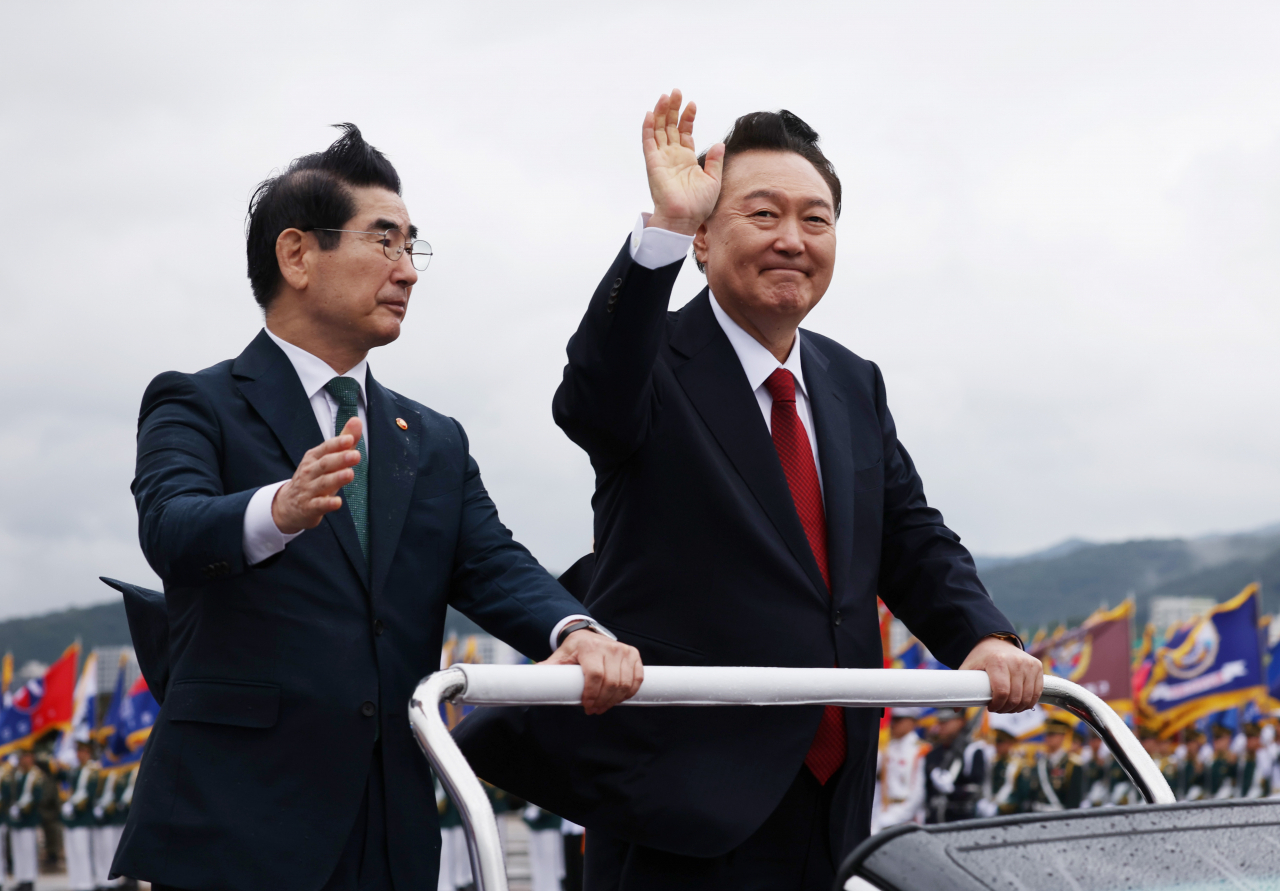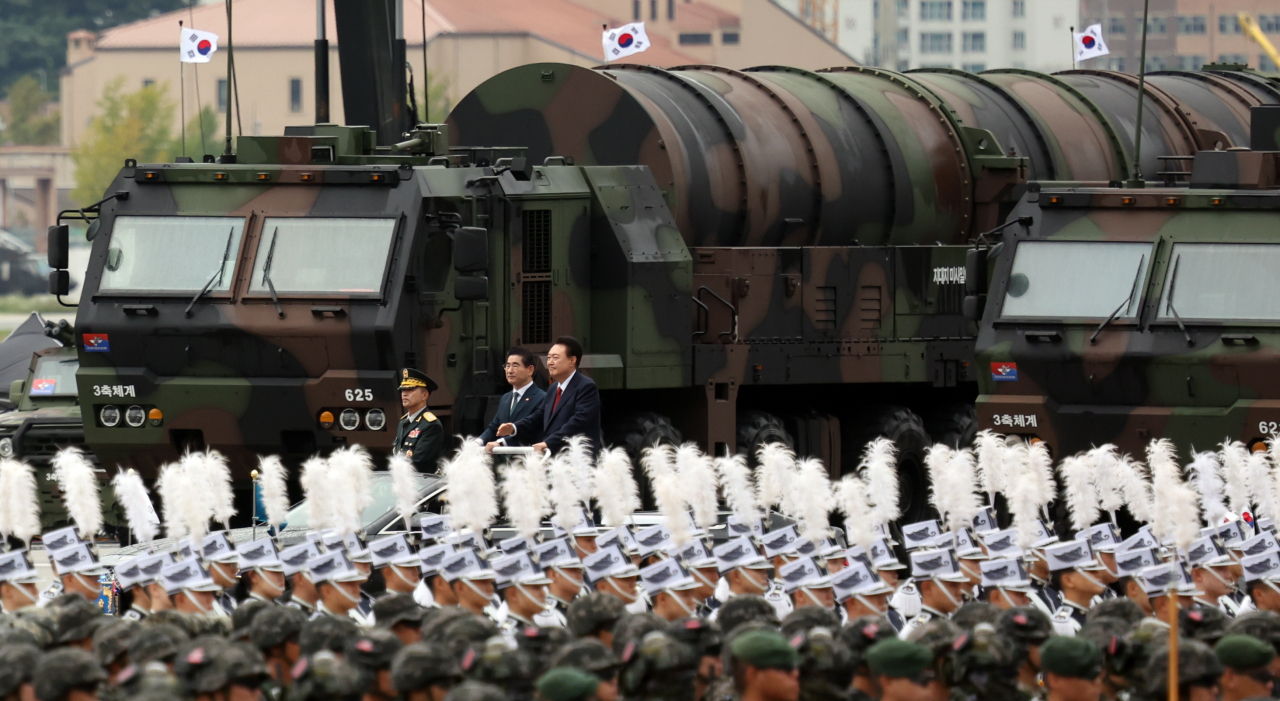 |
President Yoon Suk Yeol (right) waves to a crowd during the Armed Forces Day ceremony held at Seoul Air Base on Tuesday. On his left is Minister of National Defense, Kim Yong-hyun. (Yonhap) |
President Yoon Suk Yeol said the Kim Jong-un regime would face its destruction should it attempt a nuclear attack at the Armed Forces Day ceremony on Tuesday, in a warning accompanied by a rare showcase of powerful weapons targeting North Korea.
“If North Korea ever tries to use a nuclear weapon, it will be met with a decisive and overwhelming response from our armed forces and alliance with the US. And that will be the day its regime ends,” he said.
The warning from the president came as North Korea has made a public show out of its leader Kim’s visit to a secret uranium enrichment site, in what the South Korean spy service said was a move aimed at the US presidential election in November.
This year, Armed Forces Day was honored as a state holiday for the first time in 34 years as a tribute to people who have served in the military.
The Armed Forces Day celebration featured a massive parade of weapons and military hardware across Seoul, among them the country’s most powerful ballistic missile, the Hyunmoo-5 that has been dubbed “monster” for its size. US troops and aircraft participated in the parade, in an apparent show of the security commitment to its ally.
Yoon said South Korea’s alliance with the US has been upgraded to a “nuclear-based alliance” by the Washington Declaration signed by himself and US President Joe Biden in April last year. “Our government will build on the solid South Korea-US alliance to further strengthen the security cooperation of South Korea, the US and Japan,” he said.
Yoon added that the kind of peace that depends on the good intentions of the enemy was a “mere mirage.” “The only way to secure peace is through enhancing our strength,” he affirmed.
The president noted that since the 1950-53 Korean War, South Korea has grown its military power to become a major exporter of arms globally. “We have walked the path of freedom, prosperity and peace. North Korea, on the other hand, insists on continuing down the path of regression,” he said.
He said North Korea was ignoring the plight of its people while expanding its missile and nuclear programs and engaging in “despicable provocations” such as launches of garbage-filled balloons. From May, North Korea has periodically flown hundreds of balloons carrying garbage toward the South, with the latest occasion being just last week.
He criticized Kim for declaring the two Koreas separate, saying his regime has “gone so far as to reject reunification,” and called out North Korea’s arms trade with Russia as being “illegal” and “in violation of international norms.”
The ceremony held at the Seoul Air Base in the morning was attended by Minister of National Defense Kim Yong-hyun, Joint Chiefs of Staff Chairman Adm. Kim Myung-soo, South Korea-US Combined Forces Commander Gen. Paul LaCamera as well as other military leaders, former chiefs of staff and commanders of the armed forces.
 |
President Yoon Suk Yeol (center) passes by a transporter erector launcher carrying the Hyunmoo-5 ballistic missile during a ceremony marking Armed Forces Day on Tuesday at Seoul Air Base in Seongnam. (Yonhap) |
Later in the afternoon, crowds packed the streets in central Seoul along the route of the parade of military hardware and march of service men and women from all branches of the armed forces.
One of the highlights of the parade was the first-ever display of the Hyunmoo-5 ballistic missile, designed to penetrate North Korean underground bunkers. The intermediate-range missile is capable of carrying a warhead weighing about 8 tons, among the heaviest in the world.
More than 40 aircraft, including the KF-21, the first indigenous fighter, moved through Seoul skies in formation.
On the US flying its B-1B strategic bomber over Seoul, North Korea threatened a “corresponding action” in a statement on the same day from its vice defense minister, Kim Kang-il.
In the statement, carried by its state-run Korea Central News Agency, the North Korean vice defense minister said the deployment of US strategic assets for the South Korean parade was nothing more than a “military bluff.”
To commemorate the founding anniversary of its army, South Korea launched the new Strategic Command dedicated to deterring and countering North Korea’s nuclear and weapons of mass destruction capabilities. The establishment of the new command has been one of the Yoon administration’s policy agenda.
“As South Korea’s only strategic force for North Korean nuclear and WMD deterrence and response, we shoulder a great responsibility,” Lt. Gen. Jin Young-seung, the inaugural strategic commander, said, vowing to “do whatever it takes to protect the safety of our country and its people.”







